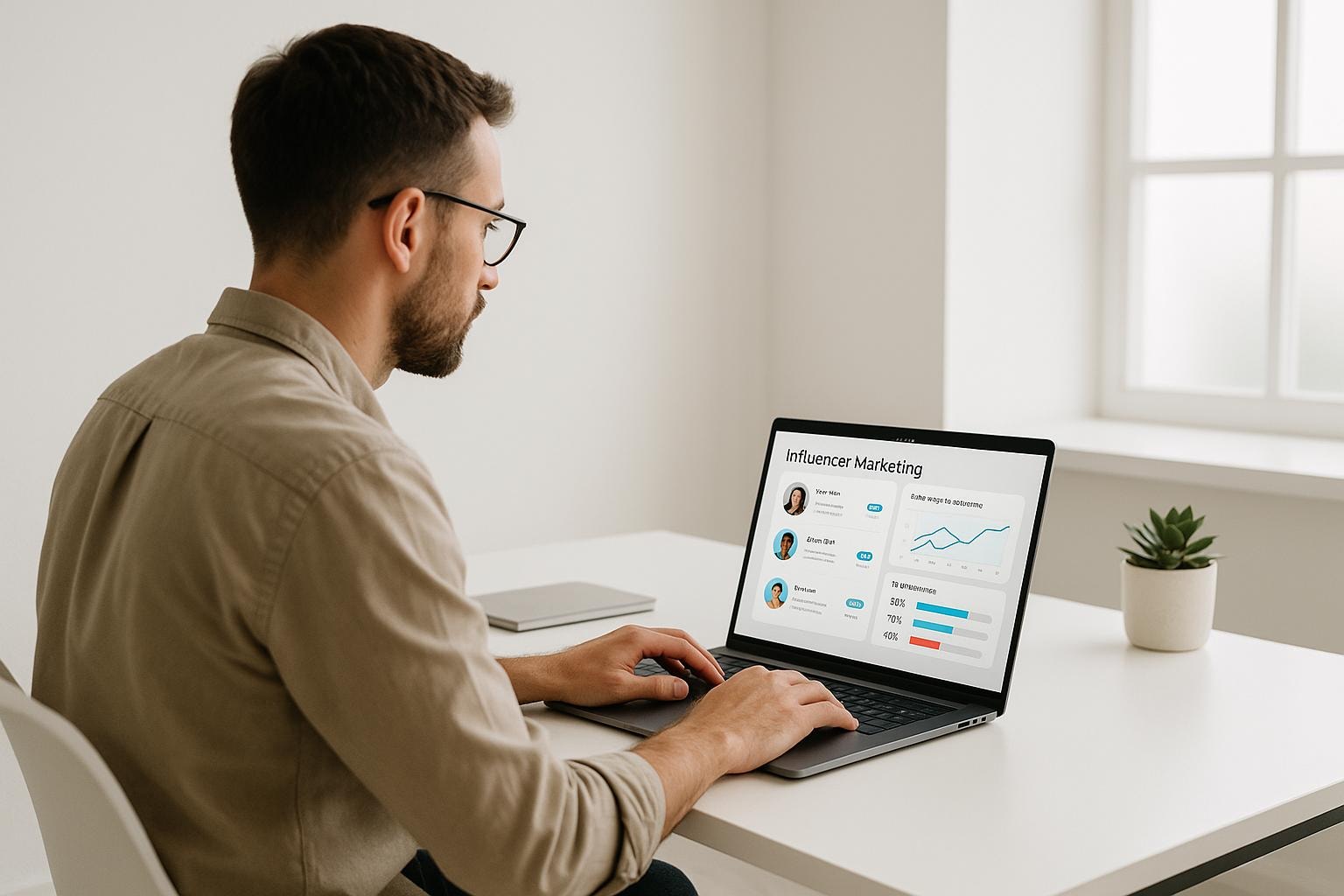
AI Tools for SMBs: Influencer Marketing Use Cases
Learn how AI tools help small businesses run professional influencer campaigns without big budgets or dedicated marketing teams.

Written by
Adam Stewart
Key Points
- Use AI fraud detection to spot fake followers and protect your budget
- Find the right influencers in minutes with smart search technology
- Track real ROI with automated analytics connected to your sales data
- Connect campaigns directly to Shopify for smooth workflow management
Finding the right influencers, managing campaigns, and tracking results used to be time-consuming and costly. AI tools now simplify these tasks, making influencer marketing faster and more effective for SMBs. Here’s what you need to know:
-
Key Benefits:
- Quickly find influencers based on specific criteria (e.g., location, engagement rates).
- Automate campaign tasks like contracts, content approval, and payments.
- Access detailed analytics to measure ROI and improve future campaigns.
-
Top Tools:
- Sprout Social: Combines social media management with influencer discovery and analytics.
- Influencity: Offers detailed audience insights and fraud detection for data-driven campaigns.
- Impact.com: Focuses on performance tracking and affiliate marketing integration.
- Later: User-friendly platform with streamlined workflows for smaller teams.
Each tool has strengths and limitations, so SMBs should choose based on their budget, goals, and team size. AI tools are leveling the playing field, making influencer marketing more accessible and efficient for smaller businesses.
1. Sprout Social
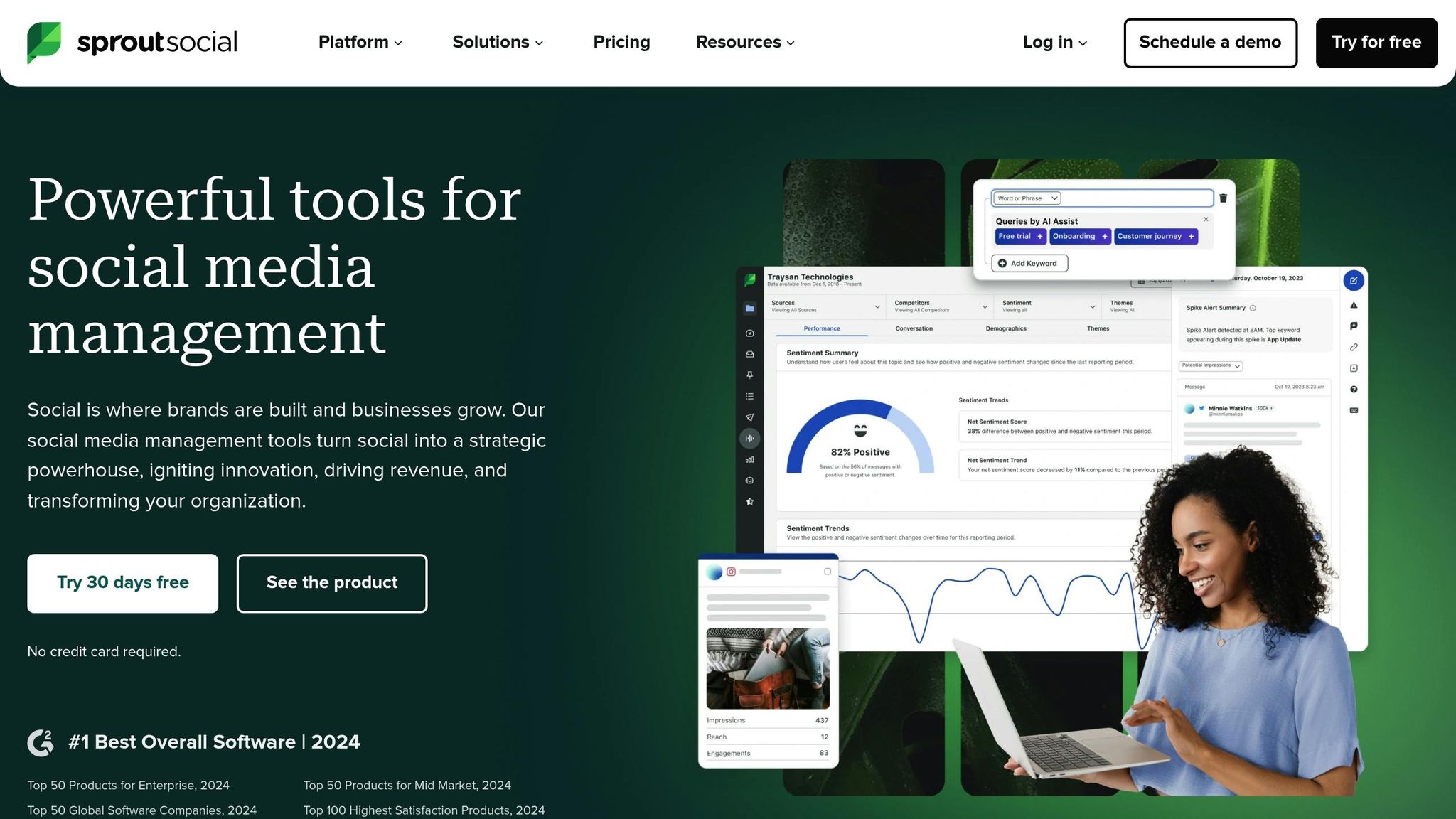
Sprout Social is a powerful social media management platform that combines traditional tools with AI-driven features, making it easier for businesses to manage social media, discover creators, and automate campaigns.
Influencer Discovery
With its AI Assist feature, Sprout Social simplifies the process of finding the right creators for campaigns. It uses a topic-based semantic search to help small and medium-sized businesses (SMBs) identify suitable influencers. Beyond discovery, it evaluates potential partners using AI-driven data to ensure they align with brand safety standards and campaign goals.
Campaign Automation
Sprout Social streamlines campaign management by centralizing tasks like outreach, contracting, and content approval into a single workflow. This unified approach lets SMBs tailor the process to fit their needs while reducing the need for manual oversight. The Creator Hub further enhances efficiency by managing content submissions and approvals, giving businesses a smoother way to handle influencer campaigns. Plus, the platform offers detailed performance analytics to measure campaign success.
Analytics and Reporting
Sprout Social’s AI-powered analytics take the guesswork out of influencer marketing. These tools save time, improve productivity, and make customer care more efficient. Integrated reporting provides a clear picture of which creators and strategies are delivering results, helping businesses understand how influencer campaigns contribute to their broader goals. This data-driven approach ensures SMBs can make informed decisions quickly.
Integration with SMB Tools
The platform also integrates seamlessly with tools SMBs already use, enhancing efficiency across the board. For companies relying on phone-based customer service - like those using AI services such as Dialzara - Sprout Social’s analytics can track leads generated by influencers, directly connecting campaign efforts to tangible business outcomes. This integration helps businesses scale engagement and improve social interactions across multiple channels.
2. Influencity
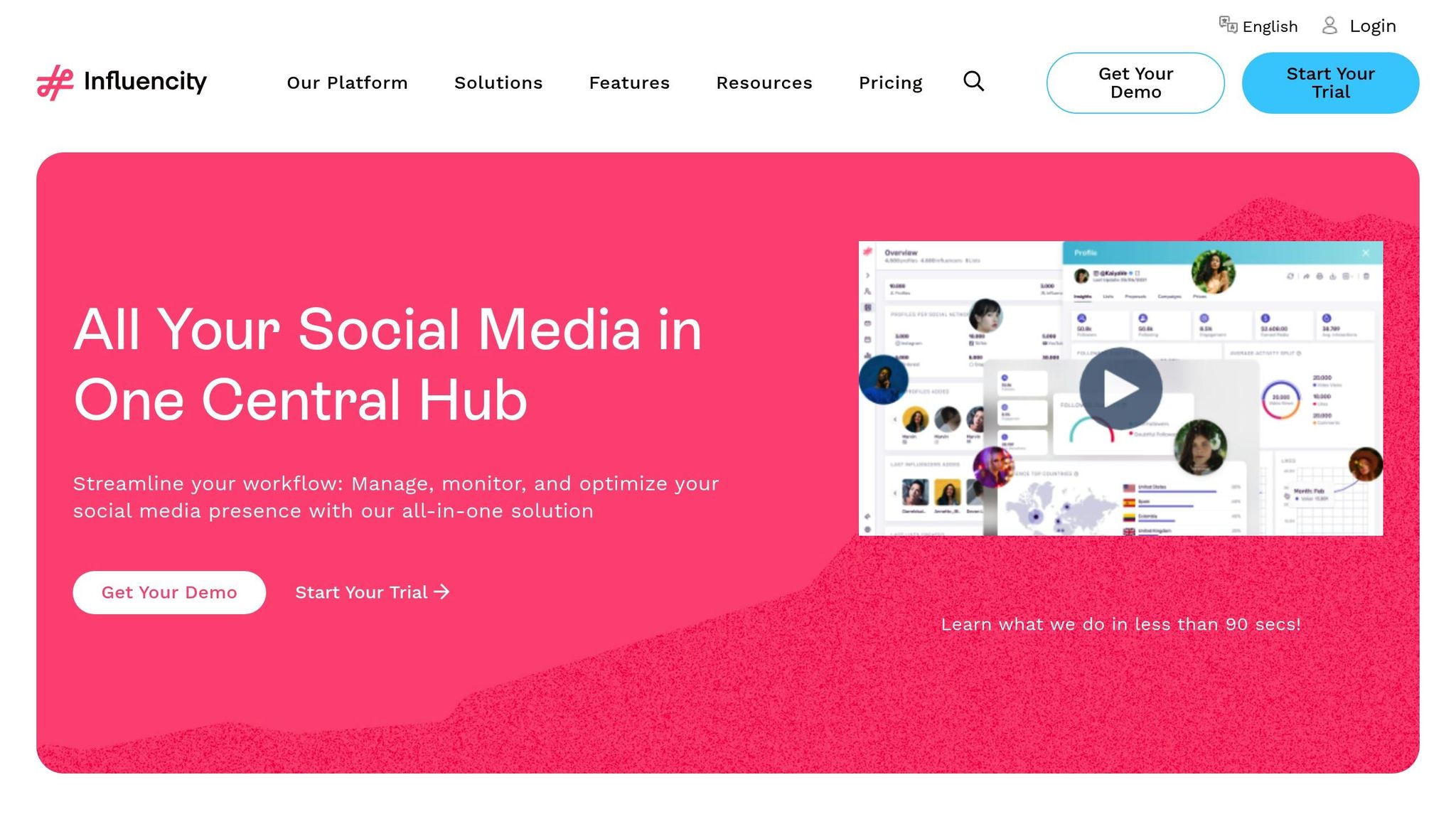
Influencity is an influencer marketing platform designed specifically for small and medium-sized businesses (SMBs). It combines influencer discovery with detailed analytics, making it a useful tool for businesses aiming to grow their influencer campaigns efficiently.
Influencer Discovery
Influencity provides access to a global database of influencers across major platforms like Instagram, TikTok, and YouTube. With its advanced filtering options, businesses can narrow down their search by audience demographics, engagement rates, and content categories, ensuring they find the perfect fit for their campaigns.
Isabella Carson, Senior AC & Creative PR at Dentsu, shares: "What I like most about Influencity is the detailed statistic which the platform provides on talent from across the globe."
The platform also simplifies the process of vetting influencers by offering detailed profile analyses. Once the right influencers are chosen, its reporting tools help businesses understand which collaborations are driving real engagement.
Analytics and Reporting
Influencity automatically gathers post-performance data from Instagram, TikTok, and YouTube, presenting it in easy-to-read visual reports. These reports link campaign activities to outcomes, making it simple to see what strategies are working and where adjustments are needed. The platform also tracks unique followers within campaigns, providing SMBs with audience insights such as age, gender, and location to fine-tune their targeting efforts.
Amalia T., Head of Business Development, Mid-Market, says: "Best platform currently on the market. We've used a lot of tools, and this is the only one that gives us info on the unique followers in a campaign or a group of influencers."
Reports can be shared through real-time URL links, keeping stakeholders updated without requiring manual updates - saving time and improving communication.
Integration with SMB Tools
Influencity goes beyond discovery and analytics by offering integrations that streamline workflows for SMBs. For example, it connects directly with Shopify stores, allowing businesses to set up automated seeding programs. Through these programs, influencers can receive products via gift codes, with the entire process - from product selection to bulk email distribution - managed within the platform. This integration bridges the gap between e-commerce and influencer outreach, making product-based campaigns far more efficient.
Mark D., Founder of a small business, notes: "It has a huge database of influencers and reporting through the tool has been extremely valuable to the clients we work with."
3. Impact.com
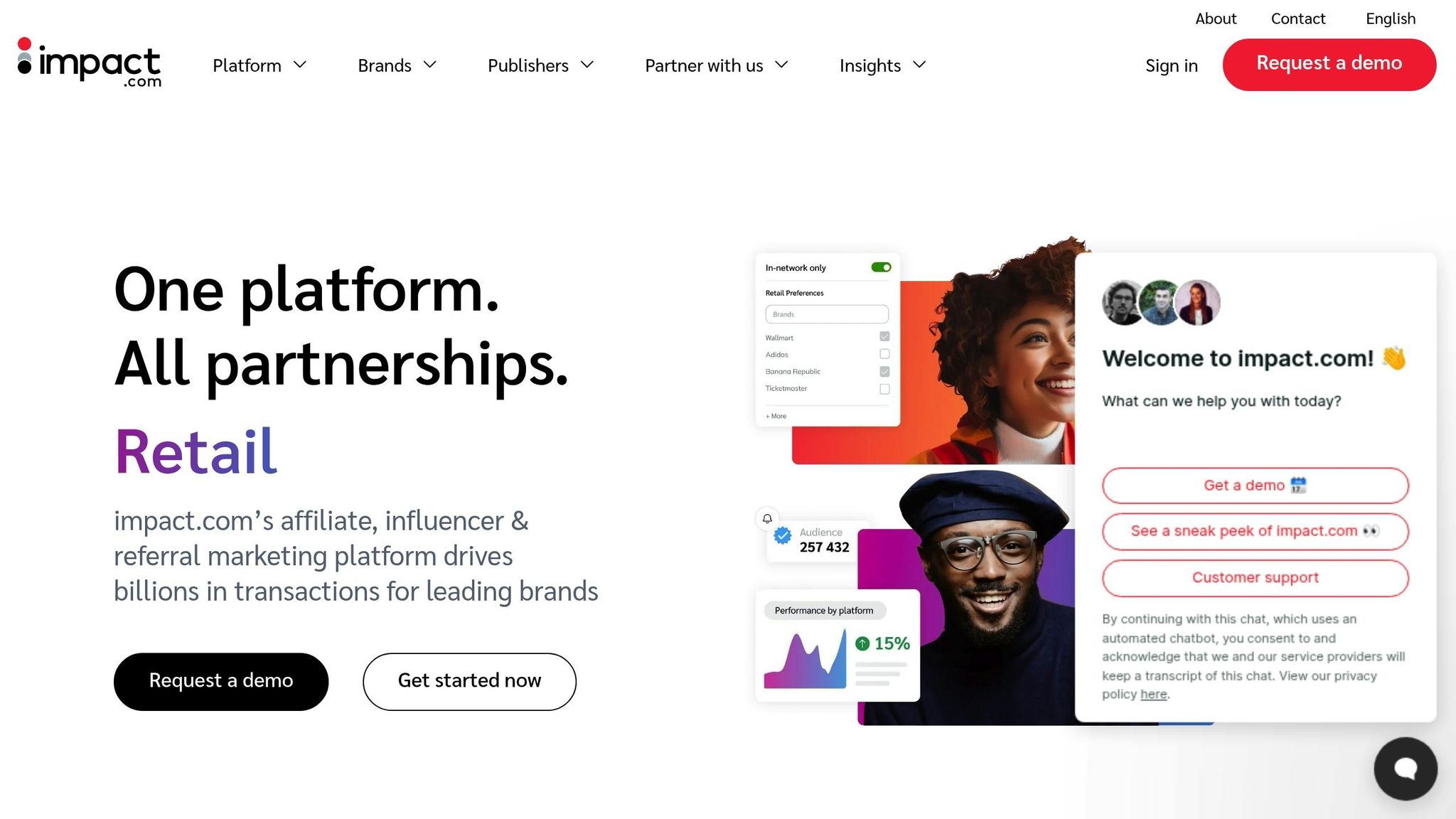
Impact.com is a platform designed to simplify influencer marketing by automating workflows and offering insights that help businesses achieve measurable results. At its core, Impact.com focuses on making campaign management easier through advanced automation.
Campaign Automation
One of Impact.com's standout features is its ability to automate tasks that typically take hours, reducing them to just minutes. The platform's Creator v1.5 tool includes features for automating key aspects of campaign management, such as creator negotiations, onboarding, and payment processing.
From handling surveys and managing deliverables to processing payments, Impact.com takes care of the nitty-gritty details. It even automates task reminders and tracks deliverables, ensuring nothing slips through the cracks. Additionally, businesses can use customizable statements of work to assign tasks and set compensation for multiple creators in one go.
Nicola Cronin, Influencer Marketing Manager at Front of the Pack, shared:
"impact.com helped us scale our influencer program quickly from a gifting to a CPA capacity. Its huge pool of international talent eliminates time spent on manual research and outreach. We were able to onboard influencers to an affiliate commission structure, something we couldn't find elsewhere. Truly unique, impact.com's influencer marketing platform stands out from the rest."
With campaign processes automated, businesses can focus on strategy while leveraging Impact.com's analytics to gain real-time insights.
Analytics and Reporting
Impact.com provides integrated reporting tools that connect campaign performance directly to business outcomes. Its full-funnel reporting consolidates data from all channels into a single platform, offering businesses a clear view of how their influencer campaigns perform at every stage of the customer journey.
The platform delivers real-time tracking across three key areas:
- Performance by campaign: Displays metrics like clicks, actions, revenue, engagement, and conversion rates, offering a detailed view of how each campaign is performing.
- Performance by creator: Tracks individual influencer performance, measuring reach, impressions, engagement, clicks, and actions across campaigns.
- Performance by social platform: Monitors activity across all social media channels, tracking influencer count, content production, and engagement rates.
A great example of these analytics in action is B&Q, a UK-based home improvement retailer. Using Impact.com's real-time data, they quickly responded to the success of influencer Jade Sweeney's DIY post by commissioning more content. This collaboration grew into a partnership, with Jade eventually starring in their Christmas campaign, which exceeded average view rate targets by 283%.
The platform also offers automated wrap reports, which can be shared with stakeholders to highlight how campaigns contribute to business goals, saving time and keeping everyone on the same page.
Integration with SMB Tools
Impact.com's integration capabilities go beyond reporting, extending into compliance and workflow management. The platform automates critical compliance tasks, such as creating tailored contracts, managing workflows, and monitoring social activity.
For small and medium-sized businesses (SMBs) juggling multiple partnerships, Impact.com provides a unified view of performance across social platforms. It tracks metrics like average engagement rates and total impressions, making it easier to evaluate overall marketing efforts. For instance, iubenda, a software company based in Milan, used Impact.com's dashboards and tools to enhance their affiliate program, resulting in a 30% increase in traffic-generating partners.
Another key feature is access to first-party creator data. This allows businesses to make informed decisions about long-term partnerships without needing external data sources. By identifying top-performing creators and pinpointing the most effective platforms, SMBs can allocate resources more strategically.
sbb-itb-ef0082b
4. Later
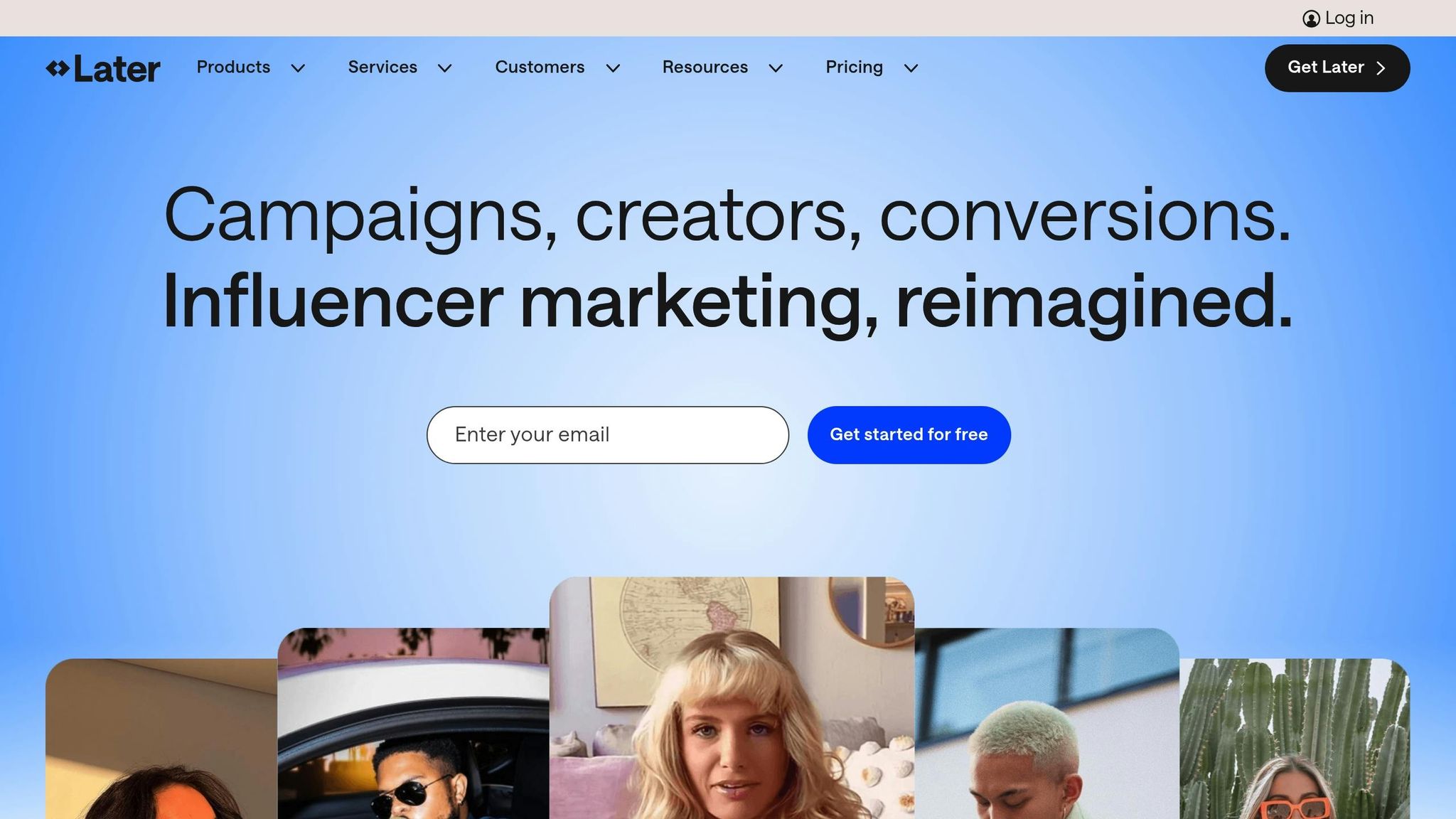
Later is a standout influencer marketing platform, offering a mix of powerful discovery tools and streamlined automation. With 53 million engagements generated through over 6,886 campaigns for 570+ brands, it's no surprise that Later has become a go-to for small and medium-sized businesses (SMBs) looking to simplify influencer management while still running impactful campaigns.
Influencer Discovery
At the heart of Later's discovery features is its Influencer Index, a massive database of over 10 million creators. This gives SMBs access to a wide range of influencers across different niches and audience sizes, making it easier to find the perfect match for their brand.
What sets Later apart is its AI-powered matching system. Instead of just relying on basic demographic filters, the platform combines artificial intelligence with human insights to connect brands with creators who truly align with their values and goals. Users can search for influencers based on criteria like interests, keywords, demographics, and social platforms. Creators are also grouped into tiers - Micro, Macro, Mega, and Advocates/Referrers/Loyalists - making it easier for businesses to target the right level of influence for their campaigns.
"We are able to quickly find new influencers to work with through their platform. They have made discovering new partnerships even easier over time with more search capabilities." - Sarah Falardeau, Marketing Manager
This feature has been highly rated by users, with 95% of Later Influence users calling the Influencer Discovery tool important or highly important. Once influencers are identified, the platform makes campaign management seamless.
Campaign Automation
Later takes the hassle out of campaign management by automating tedious tasks. From templated messages for consistent communication to workflow transitions, the platform ensures smooth collaboration at every stage of a campaign.
It supports a variety of campaign types, such as consumer research, seasonal user-generated content (UGC), ambassador programs, and affiliate campaigns. This versatility means SMBs can handle all their influencer marketing needs without juggling multiple tools. Later also simplifies onboarding with custom application pages where creators can connect their accounts and share relevant details.
For content approval, the platform includes a draft review feature that allows internal teams to comment and share consolidated feedback before publishing. This streamlined process ensures clarity and keeps campaigns on track.
Analytics and Reporting
Later doesn’t just stop at automation - it also delivers detailed analytics. The platform automatically collects and organizes engagement metrics, giving businesses clear insights into which creators and content are performing best. This data-driven approach helps SMBs refine their strategies and maximize ROI.
Integration with SMB Tools
To further enhance its usability, Later integrates with key tools and services. It offers three pricing tiers - Platform Only, Platform + Services, and Full-Service - with details available upon request. All plans include unlimited users, campaigns, and creator partnerships, making it a scalable option for growing businesses. Additionally, Later connects with major affiliate networks like Rakuten, Impact, and Commission Junction (CJ), allowing SMBs to align influencer marketing with broader affiliate strategies.
For SMBs experiencing increased customer inquiries due to successful influencer campaigns, tools like Dialzara can complement Later's efforts. Dialzara’s AI-powered virtual phone answering service manages tasks like booking appointments and handling customer service 24/7, ensuring that the buzz generated by influencer campaigns translates into satisfied customers and captured leads.
Later’s user-friendly design makes it accessible for small teams without dedicated influencer marketing experts. At the same time, its automation features give SMBs the ability to compete with larger companies that have more resources for manual campaign management. By combining simplicity with robust functionality, Later helps businesses unlock the full potential of influencer marketing.
Benefits and Drawbacks
AI-powered influencer marketing tools each come with their own set of advantages and challenges. For small and medium-sized businesses (SMBs), understanding these trade-offs is crucial to making decisions that fit their goals, budget, and resources.
Sprout Social is a powerhouse when it comes to managing social media comprehensively. It combines influencer discovery with advanced analytics, making it a go-to for businesses seeking an all-in-one platform. However, the premium pricing can strain smaller budgets, and the tool's complexity might be intimidating for teams without social media expertise.
Influencity shines with its detailed audience insights and robust fraud detection features. Starting at $198/month and going up to $998/month, it’s a strong choice for data-driven campaigns. That said, the cost can be a hurdle for startups or very small businesses. Its ability to verify influencer authenticity is particularly appealing for brands prioritizing credibility.
Impact.com is tailored for SMBs that focus on measurable returns, offering affiliate marketing integration and performance tracking. While it’s excellent for businesses aiming for clear ROI and sales attribution, its performance-driven approach might feel overly complex for those simply looking to boost brand awareness.
Later stands out with its easy-to-use interface and streamlined workflow automation. It supports unlimited users, campaigns, and creator partnerships across all pricing tiers, making it a scalable option for growing businesses. However, it lacks some of the advanced analytics offered by other tools, which could limit its appeal for data-heavy strategies.
| Tool | Key Strengths | Main Limitations | Best For |
|---|---|---|---|
| Sprout Social | Social management, advanced analytics | High cost, steep learning curve | SMBs with social media expertise |
| Influencity | Audience insights, fraud detection | Premium pricing ($198–$998/month) | Data-driven campaigns with larger budgets |
| Impact.com | Performance tracking, affiliate integration | Complex for brand awareness campaigns | ROI-focused businesses |
| Later | User-friendly, scalable pricing, automation | Limited advanced analytics | Small teams or first-time marketers |
These comparisons highlight the importance of balancing features with affordability. SMBs often find the most value in tools that meet their immediate needs while allowing room for growth as their marketing efforts expand.
Beyond influencer marketing platforms, managing customer inquiries is another critical factor. For example, Dialzara's AI phone answering service addresses a common pain point: 60% of customers prefer calling local businesses after finding them online, but only 38% of these calls are answered [17]. By ensuring every inquiry is handled, businesses can maximize the impact of their influencer campaigns.
For SMBs, the real challenge lies in balancing functionality with cost. While enterprise-level tools offer extensive features, many of these may go unused by smaller businesses, making them less practical. Hidden expenses, like additional user licenses or premium add-ons, should also be factored into the decision-making process. A thoughtful approach to selecting tools can help SMBs achieve their goals without overspending.
Conclusion
AI tools are transforming how small and medium-sized businesses (SMBs) approach influencer marketing, making it faster and more efficient than ever. These advancements open the door to operational improvements and smarter strategies.
For instance, AI platforms can reduce the time spent vetting influencers by up to 50% while offering access to an impressive database of 400 million profiles. This kind of scale and automation, once reserved for large enterprises with hefty budgets, is now within reach for smaller businesses.
On top of that, features like advanced fraud detection and predictive analytics minimize costly mistakes, ensuring marketing dollars are spent wisely. These tools also provide more reliable returns, giving SMBs greater confidence in their campaigns.
But the benefits don’t stop at campaign management. By integrating services like Dialzara’s 24/7 AI phone answering system, SMBs can handle the increased engagement generated by campaigns. This ensures every customer inquiry is captured, all while cutting operational costs by up to 90%. It’s a seamless way to turn campaign interest into real customer connections.
AI is leveling the playing field, granting SMBs access to the same targeting, analytics, and automation capabilities that were once exclusive to big brands. To get started, businesses should focus on tools that meet their immediate needs - whether that’s finding influencers, tracking campaigns, or improving operational efficiency. Over time, incorporating AI across more areas of the business can lead to steady growth without ballooning expenses.
The businesses that embrace these AI tools now will position themselves for long-term success. The technology is here, and it’s more accessible than ever for SMBs ready to take the leap.
FAQs
How can small businesses choose the right AI tool for influencer marketing that fits their goals and budget?
Small businesses can pick the right AI tool for influencer marketing by zeroing in on features that match their unique needs. Look for tools that excel in areas like finding influencers, analyzing audience data, spotting fake followers, and managing campaigns. It’s also smart to choose solutions that include ROI tracking and work seamlessly with your existing systems.
When deciding, think about your campaign goals, budget, and how easy the tool is to use. Focus on platforms that deliver trustworthy analytics and help you connect with genuine influencers. This approach ensures you’ll get the most out of your investment and build strong, effective influencer partnerships.
What challenges might small businesses face when using AI tools for influencer marketing?
Small businesses often face hurdles when integrating AI tools into their influencer marketing strategies. One major issue is preserving trust and connection. AI-generated content or influencers might miss the personal touch that genuinely resonates with audiences, potentially putting a brand's credibility at risk if not handled with care.
Another obstacle is the constant need for updates and adjustments. AI algorithms must be regularly fine-tuned to keep up with changing audience preferences. On top of that, small businesses may struggle with tight budgets or a lack of understanding about how AI can provide practical advantages, which might prevent them from fully leveraging these tools.
That said, when approached strategically, AI has the potential to simplify influencer campaigns and help small businesses connect with their audiences more efficiently.
How can AI tools help SMBs run more efficient and successful influencer marketing campaigns?
AI tools give small and medium-sized businesses (SMBs) a boost in their influencer marketing efforts by simplifying critical tasks like tracking performance in real time, targeting the right audience, and fine-tuning content. With these tools, businesses can pinpoint the most impactful influencers, craft messages that resonate with specific groups, and tweak campaigns on the fly to achieve better outcomes.
By automating routine tasks and offering useful insights, AI not only saves time and resources but also helps improve return on investment (ROI). On top of that, AI-powered tools can strengthen customer connections by tailoring content and ensuring a consistent brand message, giving SMBs an edge in today’s competitive digital landscape.
Summarize with AI
Related Posts
Top AI Tools for Personalized Customer Service
Explore how AI tools enhance personalized customer service for SMBs, from chatbots to email marketing, while saving costs and improving efficiency.
AI Social Media Tools for SMBs: Comparison
Explore essential AI social media tools for SMBs, comparing features like content creation, scheduling, and analytics to boost engagement and efficiency.
How AI Identifies the Right Influencers for Your Brand
AI revolutionizes influencer marketing by automating influencer selection and analysis, enhancing efficiency and campaign effectiveness.
10 Best AI Tools for Influencer Identification 2024
Explore the top AI tools for influencer identification in 2024, simplifying campaign management and enhancing data-driven marketing strategies.
